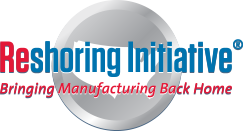Reshoring Jobs – Students need skills not just degrees to bring jobs back home
Reshoring was the key to U.S. manufacturing and economic recovery in 2021. To support this continued growth employers are searching for more skilled career ready graduates. Employers of all sizes are finding the greatest challenge facing them continues to be recruiting qualified high school and college graduates with the career ready skills to join the “new collar workforce".
Currently public education is trapped in an academic paradigm that has been increasingly irrelevant to blue collar, trades and now the “new collar” workforce. While some of these new collar jobs require a college education, most are "middle skill" jobs requiring a high school diploma, foundation of reading, math and science along with some additional training offered by an apprenticeship/certification programs. The academic paradigm emphasizes intellectual knowledge; the new paradigm emphasizes know-how and skills. Traditional high school education is designed for college bound students. Yet only a small percentage of high school graduates are academically prepared to enter college. When looking at the 2019 results of ACT tests, taken by more than 1.78 million graduates, 52% of the U.S. high school graduating class, only 37% met at least three of the four ACT College Readiness Benchmarks. Thirty six percent met none of the benchmarks. As much as society thinks the “Woke” movement will cure education, economic and social shortfall. It will not teach our students how to think – instead, it focuses on what to think - will not prepare them to be successful in a competitive job market. Employers need and want students who are critical thinkers who can work in teams no matter their socio economic background to be capable of achieving their own American Dream.Learning That Works
Companies want graduates with an eye for detail, creative critical thinking skills, a collaborative mindset and an ability to deal with ambiguity and complexity. New graduates will need foundational skills in reading, writing math and science who know how to think - not what to think. Regardless of whether students are headed for college or the new collar workforce, this type of “learning that works” will help them prepare for their future. To its credit, Virginia is moving ahead with a plan to create a new type of school that involves unique partnerships called “lab schools.” The partnerships would be between public and private universities and colleges, as well as private companies and local K-12 schools. Lab schools — which have a specific focus, such as STEM or literacy, or a particular skill or industry — will create learning environments that engage students in hands-on learning. These lab schools starting early in a child’s education can produce amazing results by creating a strong K-12 education focused on reading, math and science and offer “professional” programs in preparation for high school graduation and beyond. Students need to be encouraged to take applied science, technology, engineering, and math (STEM) classes for the new collar jobs. The New Horizons Regional Education Center (NHREC) in Virginia has engaged in a public private partnership with Newport News Shipbuilding Apprentice School, and other employers. Public school leaders, legislators, and families are working to provide career and technical educational options for students within the school districts. NHREC is the largest of nine regional centers in the Commonwealth of Virginia, NHREC has become a benchmark for community partnerships. Educators and families are discovering that career technical initiatives valued by employers can provide an equitable gateway for each student to learn how to be capable of achieving their career goals and dreams. The educational system must graduate students with the critical thinking skills to adapt to the evolving challenges of new-collar careers and the ever-changing demands for the future of work. The world of work is changing. Skills, not just degrees, are becoming the new currency of the labor market.Reimagining Education for the Future
The Institute for the Future estimates up to 85 percent of “new-collar” jobs do not yet exist, so having transferable skills will be more important than a degree. The U.S. educational system must be retooled to graduate career and college-ready citizens with the employable skills and knowledge to obtain their first job and/or continue with post-secondary education or credentialing for success in work and life. The manufacturing skills gap in the U.S. could result in 2.1 million unfilled jobs by 2030, according to a new study by Deloitte and The Manufacturing Institute. The cost of those missing jobs could potentially total $1 trillion in 2030 alone. A strong skilled workforce is key to reshoring and manufacturing growth. Reshoring Initiative® President, Harry Moser, explained that a national mind shift is needed from promoting education and degrees as the only means for achieving success to promoting both education and training as a pathway to high-paying new-collar careers of the future. To achieve these goals, educators and business leaders must form public-private partnerships and join with organizations like the Association for Manufacturing Excellence (AME), the Reshoring Initiative, Industry Reimagined 2030, and other learning organizations to become actively engaged in reinventing the educational experience by graduating skilled career ready students - who learn how to think – not what to think.
AME Dallas 2022 Conference Invitation
The Association for Manufacturing Excellence will host an international conference in Dallas Texas October 17th through the 20th, see the link. One of the featured sessions will be an international panel discussing how companies are addressing the need to replenish the talent pipeline with skilled career ready new collar workers. For more details contact - Glenn Marshall Association for Manufacturing Excellence (AME) email marsh8279@aol.com or go to www.ame.org
- - -


